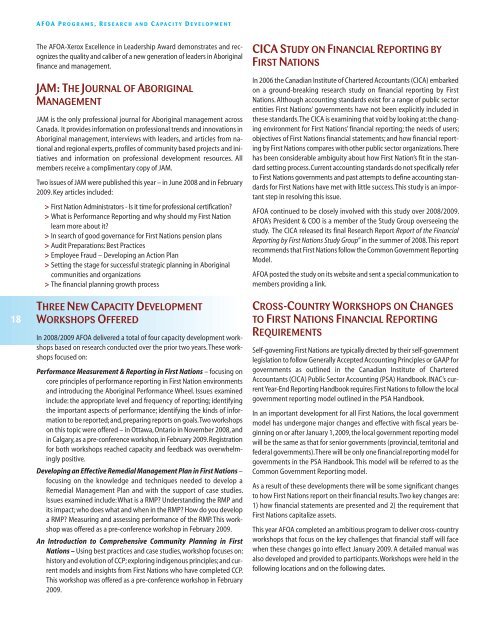ANNUAL REPORT 2008-09
ANNUAL REPORT 2008-09 - Afoa
ANNUAL REPORT 2008-09 - Afoa
You also want an ePaper? Increase the reach of your titles
YUMPU automatically turns print PDFs into web optimized ePapers that Google loves.
A F O A P R O G R A M S , R E S E A R C H A N D C A P A C I T Y D E V E L O P M E N T18The AFOA-Xerox Excellence in Leadership Award demonstrates and recognizesthe quality and caliber of a new generation of leaders in Aboriginalfinance and management.JAM: THE JOURNAL OF ABORIGINALMANAGEMENTJAM is the only professional journal for Aboriginal management acrossCanada. It provides information on professional trends and innovations inAboriginal management, interviews with leaders, and articles from nationaland regional experts, profiles of community based projects and initiativesand information on professional development resources. Allmembers receive a complimentary copy of JAM.Two issues of JAM were published this year – in June <strong>2008</strong> and in February20<strong>09</strong>. Key articles included:> First Nation Administrators - Is it time for professional certification?> What is Performance Reporting and why should my First Nationlearn more about it?> In search of good governance for First Nations pension plans> Audit Preparations: Best Practices> Employee Fraud – Developing an Action Plan> Setting the stage for successful strategic planning in Aboriginalcommunities and organizations> The financial planning growth processTHREE NEW CAPACITY DEVELOPMENTWORKSHOPS OFFEREDIn <strong>2008</strong>/20<strong>09</strong> AFOA delivered a total of four capacity development workshopsbased on research conducted over the prior two years.These workshopsfocused on:Performance Measurement & Reporting in First Nations – focusing oncore principles of performance reporting in First Nation environmentsand introducing the Aboriginal Performance Wheel. Issues examinedinclude: the appropriate level and frequency of reporting; identifyingthe important aspects of performance; identifying the kinds of informationto be reported; and,preparing reports on goals.Two workshopson this topic were offered – in Ottawa, Ontario in November <strong>2008</strong>, andin Calgary,as a pre-conference workshop,in February 20<strong>09</strong>.Registrationfor both workshops reached capacity and feedback was overwhelminglypositive.Developing an Effective Remedial Management Plan in First Nations –focusing on the knowledge and techniques needed to develop aRemedial Management Plan and with the support of case studies.Issues examined include:What is a RMP? Understanding the RMP andits impact; who does what and when in the RMP? How do you developa RMP? Measuring and assessing performance of the RMP. This workshopwas offered as a pre-conference workshop in February 20<strong>09</strong>.An Introduction to Comprehensive Community Planning in FirstNations – Using best practices and case studies, workshop focuses on:history and evolution of CCP; exploring indigenous principles; and currentmodels and insights from First Nations who have completed CCP.This workshop was offered as a pre-conference workshop in February20<strong>09</strong>.CICA STUDY ON FINANCIAL <strong>REPORT</strong>ING BYFIRST NATIONSIn 2006 the Canadian Institute of Chartered Accountants (CICA) embarkedon a ground-breaking research study on financial reporting by FirstNations. Although accounting standards exist for a range of public sectorentities First Nations’ governments have not been explicitly included inthese standards.The CICA is examining that void by looking at: the changingenvironment for First Nations’ financial reporting; the needs of users;objectives of First Nations financial statements; and how financial reportingby First Nations compares with other public sector organizations.Therehas been considerable ambiguity about how First Nation’s fit in the standardsetting process.Current accounting standards do not specifically referto First Nations governments and past attempts to define accounting standardsfor First Nations have met with little success.This study is an importantstep in resolving this issue.AFOA continued to be closely involved with this study over <strong>2008</strong>/20<strong>09</strong>.AFOA’s President & COO is a member of the Study Group overseeing thestudy. The CICA released its final Research Report Report of the FinancialReporting by First Nations Study Group” in the summer of <strong>2008</strong>.This reportrecommends that First Nations follow the Common Government ReportingModel.AFOA posted the study on its website and sent a special communication tomembers providing a link.CROSS-COUNTRY WORKSHOPS ON CHANGESTO FIRST NATIONS FINANCIAL <strong>REPORT</strong>INGREQUIREMENTSSelf-governing First Nations are typically directed by their self-governmentlegislation to follow Generally Accepted Accounting Principles or GAAP forgovernments as outlined in the Canadian Institute of CharteredAccountants (CICA) Public Sector Accounting (PSA) Handbook.INAC’s currentYear-End Reporting Handbook requires First Nations to follow the localgovernment reporting model outlined in the PSA Handbook.In an important development for all First Nations, the local governmentmodel has undergone major changes and effective with fiscal years beginningon or after January 1,20<strong>09</strong>,the local government reporting modelwill be the same as that for senior governments (provincial, territorial andfederal governments).There will be only one financial reporting model forgovernments in the PSA Handbook. This model will be referred to as theCommon Government Reporting model.As a result of these developments there will be some significant changesto how First Nations report on their financial results.Two key changes are:1) how financial statements are presented and 2) the requirement thatFirst Nations capitalize assets.This year AFOA completed an ambitious program to deliver cross-countryworkshops that focus on the key challenges that financial staff will facewhen these changes go into effect January 20<strong>09</strong>. A detailed manual wasalso developed and provided to participants.Workshops were held in thefollowing locations and on the following dates.


